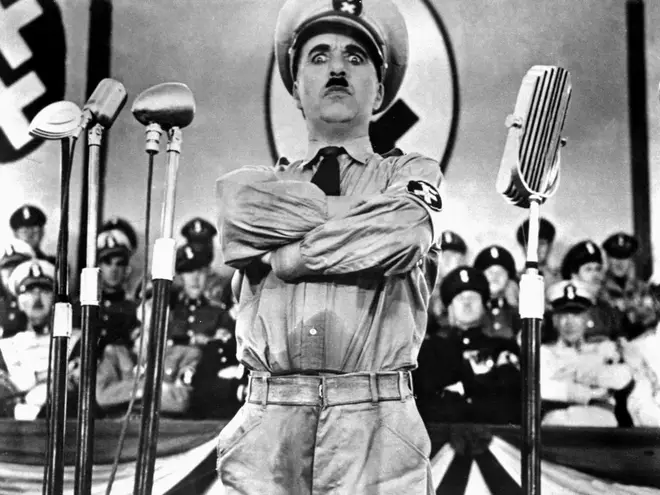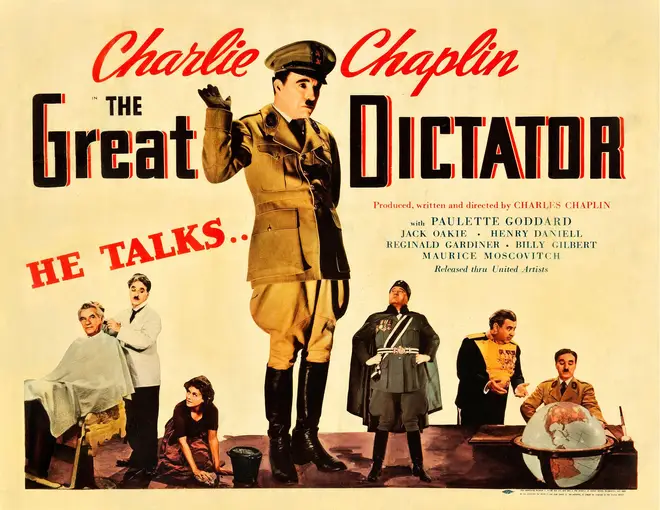On Air Now
Radio X Chilled with Sarah Gosling 10pm - 1am
9 January 2025, 16:11

The inspirational speech about freedom and unity that appears in the Caustic Love track is picked from an unlikely source…
Paolo Nutini’s third album, Caustic Love, was released in 2014 and was a huge hit. It was Number 1 in the UK and has since been classified double platinum. It also spawned the monster single, Iron Sky.
A momentous, soulful, epic ballad, the track features stirring lyrics: “We find gods and religions to / To paint us with salvation / But no one / No nobody / Can give you the power.”

Paolo Nutini - Iron Sky [Abbey Road Live Session]
As the track pauses, a voice chimes out, giving an impassioned, emotional speech that says:
To those who can hear me, I say, do not despair. The misery that is now upon us is but the passing of greed, the bitterness of men who fear the way of human progress.
The hate of men will pass, and dictators die, and the power they took from the people will return to the people. And so long as men die, liberty will never perish.
Don't give yourselves to these unnatural men! Machine men with machine minds and machine hearts! You are not machines, you are not cattle, you are men!
You, the people, have the power to make this life free and beautiful, to make this life a wonderful adventure.
Let us use that power. Let us all unite!
But who is the voice and what does the speech mean? It’s not Paisley-born Paolo Nutini, that’s for sure.

Charlie Chaplin - Final Speech from The Great Dictator
In 1939, Charlie Chaplin was a superstar. Born in South London, he moved to the US to pursue fame in the rapidly-growing movie business in Hollywood. His Little Tramp character soon became a huge hit around the globe - everyone could identify with Chaplin and his humour. Moving into features in 1921 with the classic comedy The Kid, Chaplin kicked against the advent of sound films at the end of the decade and continued to make silent pictures well into the the 1930s.

But one subject changed his mind: the rise of Adolf Hitler and the Nazis. A trip to Berlin in 1931 had seen the comic mobbed by fans, but the Nazi Party disgustedly denounced him as a “Jewish acrobat” (despite Chaplin not being Jewish). The film-maker decided to hit back and add his voice, properly for the first time, to the growing disapproval and horror at what was happening in Europe.
The Great Dictator was made just as World War II was declared in September 1939 and told the story of a thinly-disguised parody of Hitler, Adenoid Hynkel, ruling tyrant of a fictional European country called Tomainia. Chaplin played Hynkel and his identical double, a nameless Jewish barber who experiences persecution.
As Hynkel’s ambitions grow, the barber is drawn into a plot to remove him, thanks to his uncanny resemblance to the dictator. After the tyrant is mistaken for his double and sent to a concentration camp, the barber has to impersonate the ruler and make a speech to his troops.

THE GREAT DICTATOR Trailer (1940) - The Criterion Collection
He takes the opportunity to make an impassioned plea for unity and humanity - while in the story, Chaplin’s character is speaking to the massed ranks of the Dictator’s supporters, in reality he’s speaking directly to the audience, claiming:
“I’m sorry, but I don't want to be an emperor. That's not my business. I don't want to rule or conquer anyone. I should like to help everyone if possible; Jew, Gentile, black man, white. We all want to help one another. Human beings are like that. We want to live by each other's happiness, not by each other's misery."

“We don't want to hate and despise one another. In this world there is room for everyone, and the good earth is rich and can provide for everyone. The way of life can be free and beautiful, but we have lost the way. Greed has poisoned men's souls, has barricaded the world with hate, has goose-stepped us into misery and bloodshed.”
The speech shines an uncomfortable light on what was happening with Germany, but making The Great Dictator at the start of of the war, Chaplin wasn’t aware of how horrifying the reality was. Writing in his autobiography in the 60s, Chaplin admitted that he wouldn’t have made the film if he’d known the truth of the Holocaust.
“I could not have made fun of the homicidal insanity of the Nazis,” he said. In the 21st Century, the barber's impassioned plea for shared humanity remains as relevant as ever - which is why Nutini used the speech in his track.